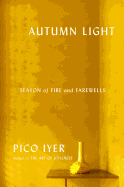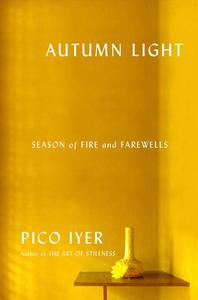
 Readers for whom the name Pico Iyer (The Year of Stillness; The Man Within My Head) conjures up images of a globetrotting journalist posting from places like Dharamsala may be surprised with the domesticated version of him they encounter in his elegiac memoir, Autumn Light. But with the beauty of its prose and the quality of its insight, this gentle, reflective reminiscence reveals again Iyer's literary virtuosity.
Readers for whom the name Pico Iyer (The Year of Stillness; The Man Within My Head) conjures up images of a globetrotting journalist posting from places like Dharamsala may be surprised with the domesticated version of him they encounter in his elegiac memoir, Autumn Light. But with the beauty of its prose and the quality of its insight, this gentle, reflective reminiscence reveals again Iyer's literary virtuosity.
Focusing on two months in the late fall of 2013, Iyer eloquently describes his life in Nara, a "rustic town" located about 20 miles from Kyoto that boasts the largest municipal park in Japan, home to 1,200 wild deer. For six months each year Iyer and his wife, Hiroko, live in a two-room apartment there, in a "bright, rectilinear neighborhood of vending machines and hair salons."
The book opens with the sudden, if not unexpected, death of Hiroko's 91-year-old father--a secret poet born in Hiroshima and a Russian prisoner-of-war in World War II. His passing provides the gateway into one of the book's dominant threads: how the bonds of family both fray and bind. This is reflected in the estrangement of Hiroko's brother, Masahiro, a Jungian psychologist educated in the West, and her distress over the mental infirmity of her mother.
Much of what makes Autumn Light so enchanting is the effortless way Iyer extracts meaning from life's quotidian details, like his frequent visits to the local ping-pong club. In health and sickness, the comings and goings of elderly players with nicknames like "Mr. Joy" and the "Emperor" (Iyer is by far the youngest player, and far from the most talented) spotlight the passage of time, another persistent theme. "I'd moved to Japan," he explains, "to live with less hurry and fear of time, and to see how an old and seasoned culture makes peace with the passing hours."
Iyer writes movingly of the season "when everything falls away" with a keen appreciation of the natural beauty that surrounds him. Yet even in arresting passages that portray the "reddening of the maple leaves under the blaze of ceramic-blue skies that is the place's secret heart," or a path that's "still carpeted in scarlet and orange, so thick I might be walking on a crackling, seething Persian rug," he reveals fundamental truths in an unobtrusively aphoristic style.
"Autumn poses the question we all have to live with: How to hold on to the things we love even though we know that we and they are dying. How to see the world as it is, yet find light within that truth," Iyer writes. Though there's forward movement in the memoir as the "season of subtractions" inches toward winter, there's also an enjoyable sense of circularity to its structure. Autumn Light's brief, meditative passages make this an ideal volume to read and read again for both pleasure and wisdom. --Harvey Freedenberg, freelance reviewer
Shelf Talker: Pico Iyer's memoir marries beauty and sadness in describing his life in Japan one autumn.

